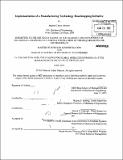| dc.contributor.advisor | Warren P. Seering and Steven D. Eppinger. | en_US |
| dc.contributor.author | Johnson, Marcus Cullen | en_US |
| dc.contributor.other | Leaders for Global Operations Program. | en_US |
| dc.date.accessioned | 2012-11-19T19:18:33Z | |
| dc.date.available | 2012-11-19T19:18:33Z | |
| dc.date.copyright | 2012 | en_US |
| dc.date.issued | 2012 | en_US |
| dc.identifier.uri | http://hdl.handle.net/1721.1/74920 | |
| dc.description | Thesis (S.M.)--Massachusetts Institute of Technology, Dept. of Mechanical Engineering; and, (M.B.A.)--Massachusetts Institute of Technology, Sloan School of Management; in conjunction with the Leaders for Global Operations Program at MIT, 2012. | en_US |
| dc.description | Cataloged from PDF version of thesis. | en_US |
| dc.description | Includes bibliographical references (p. 93-95). | en_US |
| dc.description.abstract | Strategic technology planning is a core competency of companies using technological capabilities for competitive advantage. It is also a competency with which many large companies struggle due to the cross-functional knowledge that needs to be shared, the varying perspectives that must to be aligned, the complicated network of dependencies that need to be understood and the high-degree of uncertainty involved in technology planning. Technology roadmapping has proven to be an effective strategic technology planning technique that can overcome these challenges. This thesis reviews literature on technology roadmapping and expands on this literature by applying these techniques to roadmapping the manufacturing technology. While the existing literature largely focuses on roadmapping the technologies that will directly deliver value to the customers, this thesis focuses on the technologies that indirectly deliver value to the customer. In an advanced products company, examples of the former and latter technologies are the product and manufacturing technologies, respectively. This distinction has important implications for the management of these technologies. Technology roadmapping is a powerful and flexible technique that must be tailored to the strategic context where it will be implemented. Through a case study of the development and implementation of manufacturing technology roadmapping at Raytheon Space and Airborne systems, the author seeks to provide a general set of guidelines for roadmapping a company's technology that indirectly add value to the customer. | en_US |
| dc.description.statementofresponsibility | by Marcus Cullen Johnson. | en_US |
| dc.format.extent | 95 p. | en_US |
| dc.language.iso | eng | en_US |
| dc.publisher | Massachusetts Institute of Technology | en_US |
| dc.rights | M.I.T. theses are protected by
copyright. They may be viewed from this source for any purpose, but
reproduction or distribution in any format is prohibited without written
permission. See provided URL for inquiries about permission. | en_US |
| dc.rights.uri | http://dspace.mit.edu/handle/1721.1/7582 | en_US |
| dc.subject | Mechanical Engineering. | en_US |
| dc.subject | Sloan School of Management. | en_US |
| dc.subject | Leaders for Global Operations Program. | en_US |
| dc.title | Implementation of a manufacturing technology roadmapping initiative | en_US |
| dc.type | Thesis | en_US |
| dc.description.degree | M.B.A. | en_US |
| dc.description.degree | S.M. | en_US |
| dc.contributor.department | Leaders for Global Operations Program at MIT | en_US |
| dc.contributor.department | Massachusetts Institute of Technology. Department of Mechanical Engineering | |
| dc.contributor.department | Sloan School of Management | |
| dc.identifier.oclc | 815732291 | en_US |
